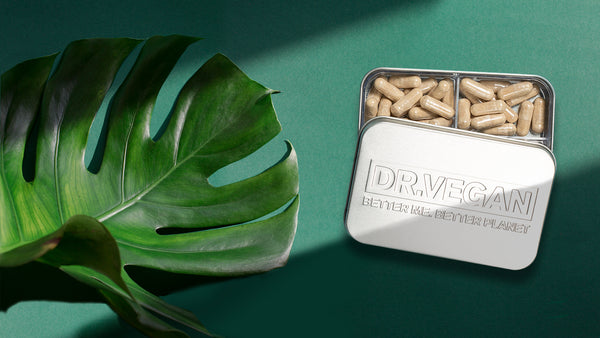Five nutrition tips for growing strong nails

Your nails can be a reflection of your inner health and dietary habits. If our nails do not get sufficient nourishment from our diet, our nail growth can slow down and our nails will become brittle. Here are 5 top tips for your diet for strong, healthy nails.
What are nails made of?
Nails are made up of layers of a protein known as 'keratin'. Keratin is also found in our skin and hair, and when they're fed the right nutrients, our skin, nails and hair all naturally grow stronger and healthier.
Changes or abnormalities in your fingernails can be indicative of a nutritional imbalance or a deficiency in important nutrients, so eating the right foods with the right nutrients will help your nails grow stronger and be more resistant to breakage and deterioration.
Not sure what your body needs? Create your Diet Profile.
A poor diet can lead to dry or brittle nails, horizontal or vertical ridges on nails, curved nail ends, darkened nails, splitting, hangnails, white lines or spots and abnormalities in nail colour.
Best foods & nutrients for strong nails
A nutrient-rich and balanced diet not only nourishes your body, it will also promote healthier fingernails.
1. Good protein intake
Nails are largely made up of a fibrous protein called Keratin which contributes to your nail strength, preventing it from damage. Including protein-rich foods to your diet is necessary for maintaining strong and healthy nail plates.
A lack of protein in the diet may lead to nails becoming thin, brittle and weak, and slow down the rate of nail growth. White bands on your nails may also be a sign of inadequate protein intake.
Good plant-based sources of protein include tofu, lentils, quinoa, soya, raw nuts and seeds. Good animal food sources include organic chicken, eggs, lean red meat and fish.
You may enjoy 'Best protein sources on a plant-based diet' and 'The proven health benefits of soya'.
2. Essential fatty acids
Omega-3 and omega-6 are essential fatty acids that provide moisture and nourishment to your nails, making them appear shinier and healthier. An insufficient amount can cause your nails to become dry and break easily.
Increasing your intake of omega-3 and omega-6 fatty acids helps to stimulate the cells in the nail bed, reducing inflammation and promoting the absorption of nutrients, which prevents brittle nails and weak tips.
Discover our sustainably sourced Vegan Omega 3 with 1,000mg Algae Omega oil providing 300mg DHA and 150mg EPA.
Raw nuts and seeds, especially walnuts, chia seeds, and flaxseed, are good sources of essential fatty acids. Flaxseed and flaxseed oil are a particularly valuable source of essential fatty acids as they're rich in omega-3 and omega-6 which are known to strengthen nails. Oily fish such as salmon and mackerel are also good sources.
3. Zinc & Selenium
Zinc and Selenium are essential trace elements with a significant effect on nail health. Zinc plays an important role in protein synthesis and is necessary for tissue growth. Zinc deficiency is associated with brittle nails, and can cause vertical ridges and indentations to form on the nails. White spots or lines on your nails can indicate that you might be low in Zinc.
Pumpkin seeds, walnuts and brazil nuts are great sources of Zinc, Selenium and essential fatty acids which help strengthen brittle fingernails and support healthy nail growth. Other good sources of zinc include dairy products, shellfish, eggs, seaweed, beans and wholegrain cereals.
4. B-vitamins
B vitamins including Biotin, Folate, Vitamin B12 & B6 are vital for our cell function and promote healthy growth of nails, hair and skin.
Supplementation with biotin has been shown to contribute significantly to nail plate thickness, helping to prevent nails splitting and combatting nail thinness. Vitamin B12 deficiency is associated with nail dryness, curved nail ends and darkening of fingernails.
Learn more in '5 signs you may be low in Vitamin B12'.
B vitamins are found in a variety of foods such as wholegrains, egg yolks, sweet potato, nuts, seafood, meat, offal and spinach.
5. Iron
Iron is required for red blood cell production, to transport oxygen around the body - including your nails. Low Iron levels can lead to softening of your nail plate causing nails to become brittle, dry and fragile which can make them collapse inwards.
Getting sufficient Iron in your diet, as well as good intake of Vitamin C to help maximise absorption, can boost nail growth and help to prevent hangnail.
You may enjoy our blog: Why is Iron so important, particularly for women.
Animal-based food sources of Iron include oysters, beef, liver and eggs, and plant-based sources such as lentils, tofu, and dark leafy green vegetables.
Our naturally sourced and plant-based Daily Multivitamin contains Iron, Zinc, Selenium, B Vitamins and 24 essential nutrients for healthy nails, hair and skin to energy, digestion and immunity every day.
View our range of vegan vitamins and supplements.
Want to hear more from our nutritionists? Sign up to our email newsletter for insights and exclusive offers:
References
- https://www.sciencedirect.com/science/article/pii/S0738081X13001351?via%3Dihub
- Cashman MW, Sloan SB. Nutrition and nail disease. Clin Dermatol 2010;28:420‑5https://www.sciencedirect.com/science/article/pii/S0738081X10000611?via%3Dihub
- Scheinfeld N, Dahdah MJ, Scher R. Vitamins and minerals: Their role in nail health and disease. J Drugs Dermatol 2007;6:782‑7
- https://www.nhs.uk/conditions/vitamin-b12-or-folate-deficiency-anaemia/
- Hochman LG, Scher RK, Meyerson MS. Brittle nails: response to daily biotin supplementation. Cutis 1993;51:303-5



